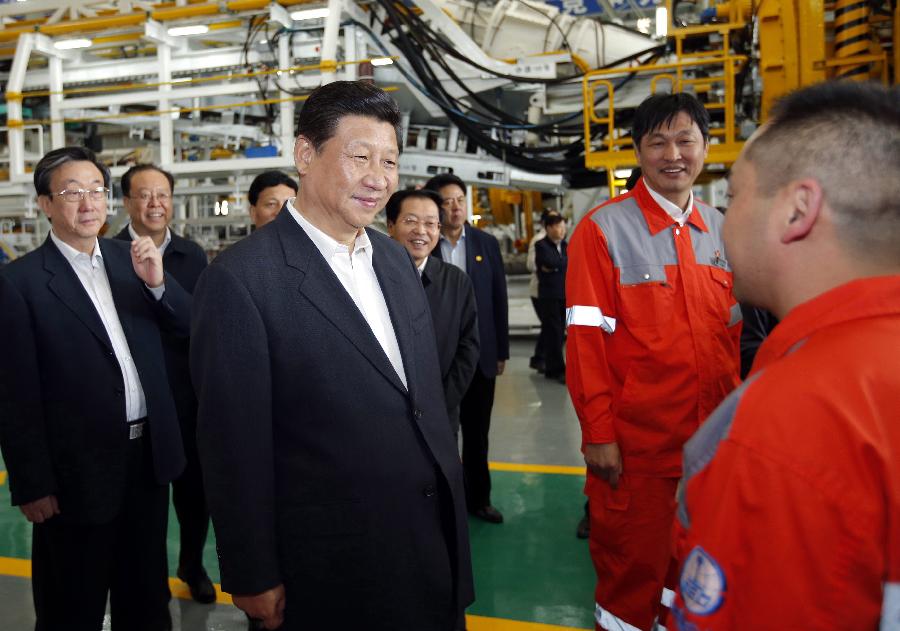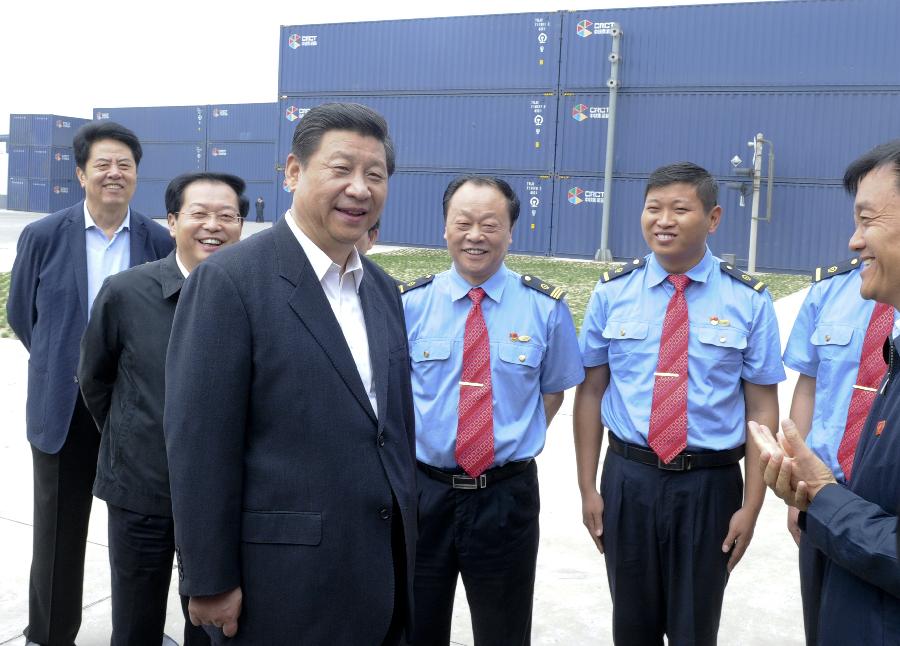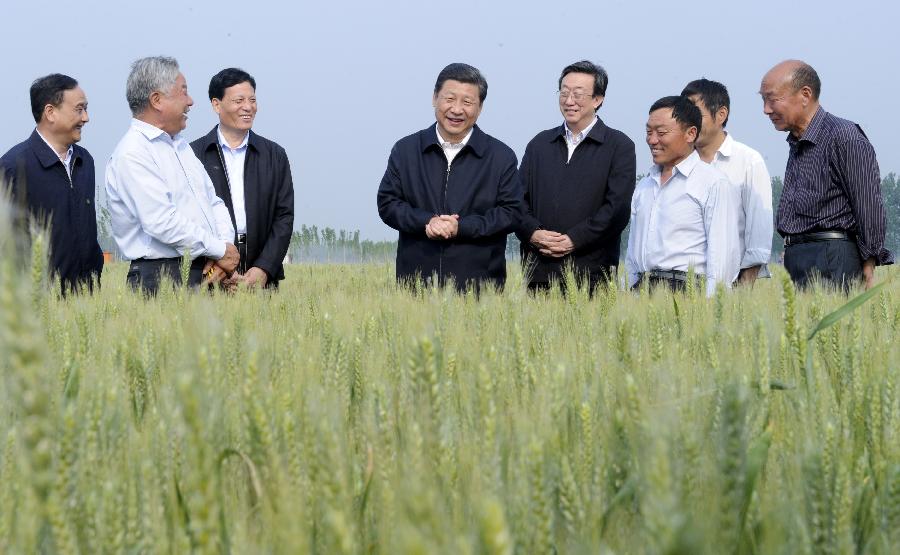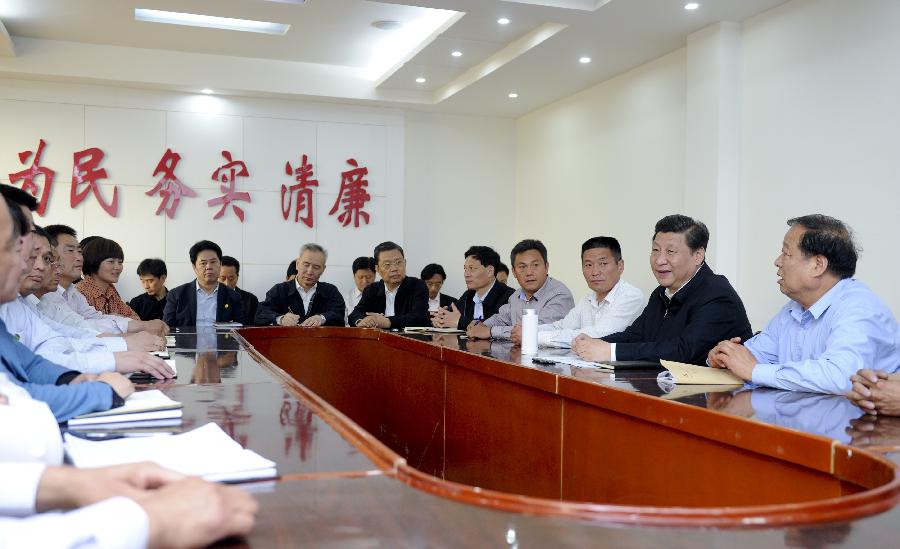China should adapt to new norm of growth: Xi
Editor:
zhenglimin 丨Xinhua
ZHENGZHOU, May 10 (Xinhua) -- Chinese President Xi Jinping said Saturday that the country should adapt to new norm for its economic growth and be cool-minded amid slowdown in the world's second-largest economy.
Chinese President Xi Jinping (L front), also general secretary of the
Communist Party of China (CPC) Central Committee and chairman of the
Central Military Commission, talks with staff members of Zhengzhou-Europe
International Block Train at Zhengzhou International Land Port in Zhengzhou,
capital of central China's Henan Province, May 10, 2014. Xi made an
inspection tour in Henan from May 9 to 10. (Xinhua/Zhang Duo)
Xi made the remark during his inspection tour to central China's Henan Province from Friday to Saturday.
"China is still in a significant period of strategic opportunity. We must boost our confidence, adapt to the new normal condition based on the characteristics of China's economic growth in the current phase and stay cool-minded," Xi said.
The country's economy has gradually slowed since the international financial crisis in 2008. Its economy expanded by 7.7 percent in both 2012 and 2013, the slowest pace since 1999.
However, China should also attach great significance to preventing diversified risks for its economy and take timely countermeasures to reduce potential negative effects, Xi said.
"The basic conditions for sustaining the country's growth have not changed, so we should stick to the fundamental principle of seeking progresses while maintaining stability in economic work," he said.
The government must continue to coordinate the relations of stabilizing growth, promoting reforms, adjusting structure, improving people's livelihood and preventing risks so as to ensure sound economic growth and social stability, according to Xi.
Xi's words are in line with recent message from some other senior officials concerning the direction of China's economic policies.
Chinese President Xi Jinping (4th L) inspects the growth of wheat
in Zhangshi Township of Weishi County, central China's Henan Province,
May 9, 2014. Xi made an inspection tour in Henan from
May 9 to 10. (Xinhua/Zhang Duo)
Premier Li Keqiang said at a forum in Hainan Province last month that China will not resort to strong short-term stimulus policies just because of temporary economic fluctuations, but rather pay more attention to sound development in the medium and long run.
China will seek growth impetus from deepening reforms, adjusting economic structure and improving people's livelihood, the premier said.
On Saturday, China's central bank governor Zhou Xiaochuan reaffirmed the stance at a conference in Beijing, saying that macroeconomic policies should be stable and no massive stimulus should be taken at present.
Zhou urged for more accurate judgment about the present economic situation, arguing that short-term economic figures may not be sufficient to help come to conclusions.
China's economic growth slowed to a six-quarter low of 7.4 percent in the first quarter of the year, down from a growth of 7.7 percent in the final quarter of 2013.
In spite of the slowdown, the pace was within a reasonable range, as the government has set the annual growth target for this year at about 7.5 percent.
During the two-day inspection, Xi visited rural areas, companies and the inland port in Zhengzhou, one of the terminals for a railway connecting the city with Europe to facilitate cargo transportation.
He stressed the significance of agriculture after inspecting a pilot area for high-standard grain production in the city of Kaifeng, saying that grain safety and the work of agriculture, farmers and rural areas are important foundation for all other government work.
Xi lauded the independent innovation at the China Railway Engineering Equipment Group Co., Ltd. after visiting an assembly plant of the company.

Chinese President Xi Jinping (L front) talks with a worker in an assembly
shop of tunnel boring machine at China Railway Engineering
Equipment Group CO., LTD in Zhengzhou, capital of central
China's Henan Province, May 10, 2014. Xi made an inspection
tour in Henan from May 9 to 10. (Xinhua/Ju Peng)
"Equipment manufacturing is the backbone of a country's manufacturing industry, but weakness still exists in many aspects of China's equipment manufacturing," Xi said.
China needs to boost investment, enhance research and development efforts to accelerate the development of the sector and gain a say in terms of advanced technology in the world, he said.
Through innovation and technological development, the country should push for the transformation from "Made in China" to "Created in China," from "China speed" to "China quality" and from "Chinese products" to "Chinese brands," according to Xi.
Chinese President Xi Jinping (2nd R) talks with representatives
of local cadres and villagers in Zhangshi Township of Weishi County,
central China's Henan Province, May 9, 2014. Xi made an inspection tour
in Henan from May 9 to 10. (Xinhua/Zhang Duo)









































